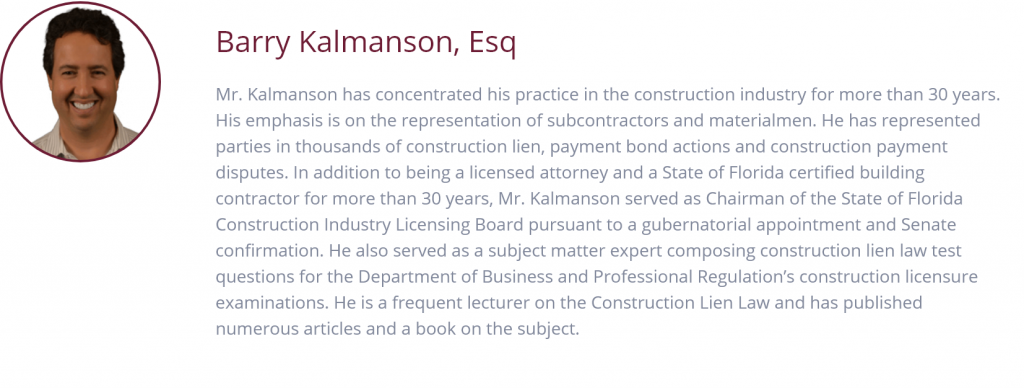
Most types of construction work in Florida require that the contractor, subcontractor or sub-subcontractor have a specific construction license to perform its scope of work. If a license is required for the work being performed, Florida law mandates that contractors, subcontractors and sub-subcontractors maintain proper licensure regulated by the state of Florida to enforce a construction lien or payment bond claim. Despite the fact that many cities and counties require a myriad of local construction licenses, these licenses are irrelevant when determining the enforceability of a construction lien or payment bond claim. Additionally, contracts entered into by an “unlicensed contractor” under Florida law are deemed unenforceable in law or in equity. In other words, an unlicensed contractor may have performed a perfect construction job with a balance due of $10 million and the property owner is not obligated to pay a single penny under Florida law. This example illustrates one of the harsh realities of Florida’s construction industry. As a result, it is crucial to have a proper state of Florida construction license for your scope of work.
A materialman, subcontractor or sub-subcontractor supplying labor or materials to an unlicensed contractor still has rights to contract claims and to perfect a construction lien or payment bond claim (so long as that subcontractor or sub-subcontractor maintains a proper state license for its scope of work, if required). Materialmen are not required to have construction licenses. Further, if a state of Florida license is not required for the scope of work to be performed under the construction contract, the individual or entity who performs that work is not considered to be unlicensed. For example, since Florida law does not include a mandatory license for a glass and glazing contractor, that scope of work can be performed without a license and the contractor still has the ability to pursue contract rights, construction lien and payment bond claims.
It is not always required for a subcontractor performing work for a properly licensed Residential, Building or General contractor under their supervision to have a separate Florida construction license. For example, a concrete mason or structural steel installer would not need a separate state of Florida construction license when performing work for a properly licensed Residential, Building or General contractor. However, a subcontractor performing plumbing, roofing, electrical or HVAC work must have a separate state of Florida construction license, even if performing work for a properly licensed Residential, Building or General contractor. Note that separate categories of licensure for plumbing, roofing, electrical and HVAC work are required under Florida law.
The Florida construction lien law also provides for construction lien rights for properly licensed professional lienors such as architects, landscape architects, interior designers, engineers and surveyors. Those individuals and entities must be licensed under Florida law (even if licensed in another state).
Florida construction license requirements are complicated and ever-changing. It is important to have the proper license and to keep the license up-to-date, if required by Florida law for your scope of work. Failure to maintain proper licensure could result in not receiving several million dollars of the final payment for an award-winning construction project completed ahead of schedule (a real-life situation on a multi-million-dollar luxury beachfront home in Florida). Don’t let this happen to you!
This information presents the general scheme of Florida’s Construction Lien Law as of May 2020. The Construction Lien Law is constantly being amended; therefore, this material should not be relied upon in place of experienced legal advice in specific situations. This material is copyrighted and cannot be reproduced without written permission from Barry Kalmanson, Esq.





